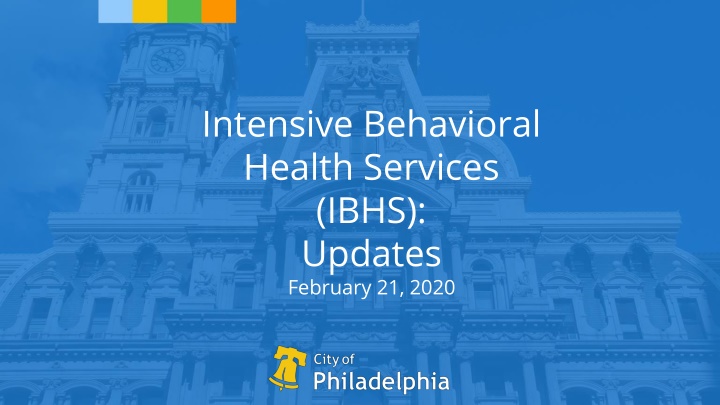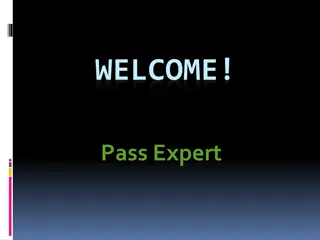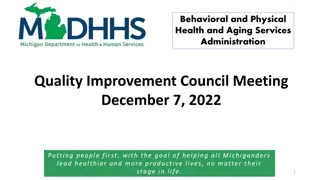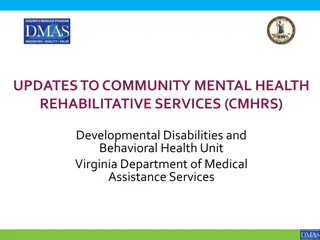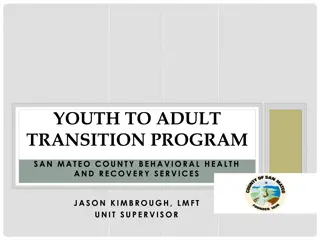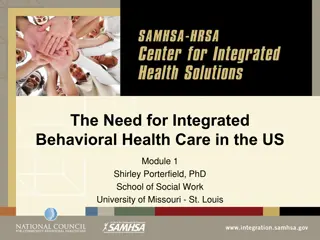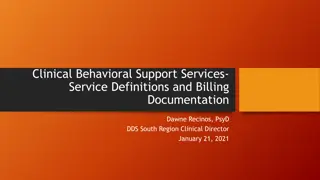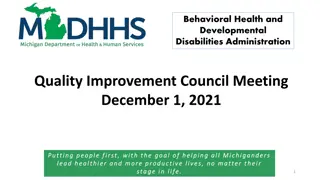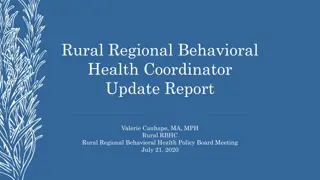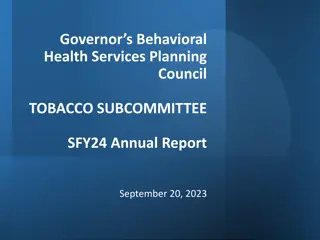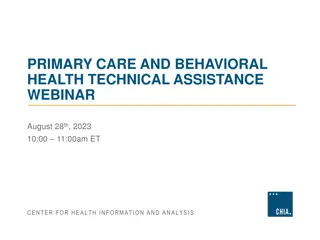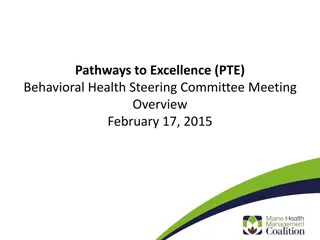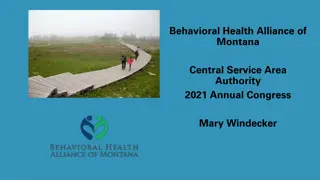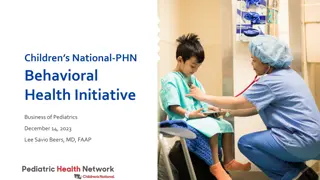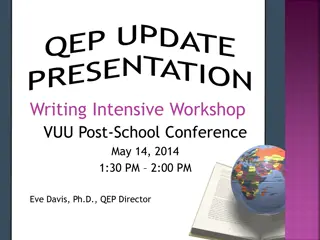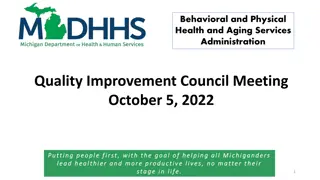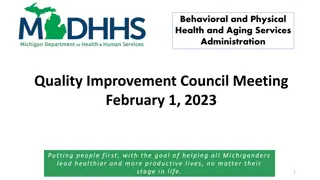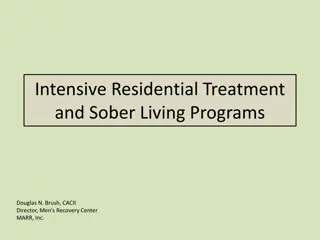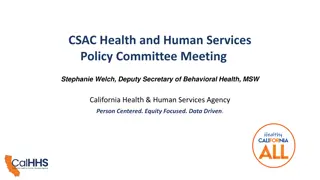Updates on Intensive Behavioral Health Services (IBHS) Regulations - February 21, 2020
This presentation provides updates on IBHS regulations as of February 21, 2020. It covers pathways for accessing BHRS/IBHS, submission guidelines, treatment codes, and more. Changes in regulations are highlighted, including the transition from BHRS to IBHS. Provider requirements and timelines for adopting IBHS processes are also discussed.
Download Presentation

Please find below an Image/Link to download the presentation.
The content on the website is provided AS IS for your information and personal use only. It may not be sold, licensed, or shared on other websites without obtaining consent from the author.If you encounter any issues during the download, it is possible that the publisher has removed the file from their server.
You are allowed to download the files provided on this website for personal or commercial use, subject to the condition that they are used lawfully. All files are the property of their respective owners.
The content on the website is provided AS IS for your information and personal use only. It may not be sold, licensed, or shared on other websites without obtaining consent from the author.
E N D
Presentation Transcript
Intensive Behavioral Health Services (IBHS): Updates February 21, 2020
2 Please note The information presented in the power point may be subject to change as IBHS regulations set forth by OMHSAS continues to evolve. Therefore information provided during today s webinar may also be subject to change. We do not advise any of the information presented or discussed during today s webinar be utilized in making business decisions for your organization. When making business decisions for your organization, please seek your organizations legal counsel as necessary.
3 Objectives Review Pathways 1, 2 and 3 for accessing BHRS/IBHS Case examples illustrating pathways, including continued stay Submission guidelines Assessment and Treatment Codes vs Traditional BHRS Levels of Care Response to FAQ s
5 Highlights of Bulletins 19-23 through 19-26 Individuals with a current prescription for BHRS, that extends beyond January 19, 2020, will be allowed to continue to receive BHRS services until the end of that authorization period January 19, 2021 will be the last day BHRS is permitted to be delivered. Beyond January 19, 2020, providers may continue to prescribe BHRS until they are a licensed IBHS provider. Once they become licensed IBHS providers, they will only make IBHS Written Orders. Providers who are fully compliant with the IBHS regulations who would like to begin to deliver IBHS prior to becoming licensed and enrolled as an IBHS provider should reach out to their provider rep for more information.
6 Highlights of Bulletins 19-23 through 19-26 Beyond January 19, 2020, providers may continue to prescribe BHRS until they are a licensed IBHS provider. Once they become licensed IBHS providers, they will only make IBHS Written Orders. Providers who are fully compliant with the IBHS regulations who would like to begin to deliver IBHS prior to becoming licensed and enrolled as an IBHS provider should reach out to their provider rep for more information.
7 BHRS alignment with IBHS regulations (during transition) Bulletins 19-23 through 19-26 BHRS authorizations will be for no more than 6 months, regardless of diagnosis Because IBHS offers a flexible assessment process, the CBE/CBR will be replaced by a Level of Care Assessment All IBHS and BHRS Services will be accessed in compliance with IBHS regulations (e.g., Written Order and Assessment) ISPTs will no longer be required, but will be incentivized and encouraged STS can only be prescribed until the last day of the 2019-2020 academic year, or June 12, 2020 for most schools. Prescriptions for school services in the fall of 2020 will align with the upcoming procurement (to be covered in future meeting)
8 Updates to Bulletins 19-23 to 19-26 Coming Soon! Reflects use of Level of Care Assessment Includes MST-PSB as a service that will continue to require an ISPT prior to authorization. Written Order Form updated for clarity
9 Bulletin 20-03 Establishes New Level of Care Codes to be used for the Assessment, Treatment Initiation Phase for providers to bill effective 1/19/2020. Traditional BHRS: 400-126, 400-127 (non ASD) , 400-128, 400-129 (ASD) ABA (CBH Designated Providers): 400-130 and 400-131 School Therapeutic Services: 400-132 and 400-133 *Requesting and episode of Assessment and Treatment initiates the authorization of two levels of care, one for assessment activities and one for treatment activities.
10 Bulletin XXXX- Coming Soon! This forthcoming bulletin will establish a new level of care, called Level of Care Assessment, which is an option for billing of the therapeutic encounter from which a written order can be generated. Event based, 1 hour unit Can be conducted by a professional qualified to write written orders Can be used after an referral is made to assess for an initial written order, or used to for updated written orders to support continued stay, or elsewhere as clinically necessary
12 Written Order Letter Written order can be generated from face-to- face activity with qualified professional Documented on the CBH Written Order Letter Providers may complete their own orders, and accept written orders from families or other providers (PCP, etc) Services may also be generated through CBH referral process
13 Written Order Diagnosis Required Elements Clinical info to support MNC Max hours per service per month Setting Measurable improvements Therapy Session Billable Services Level of Care Assessment CRC/UCC Evaluation Bundled in AIP, PHP, or RTF rate
14 Written Order * Updated* Intensive Behavioral Health Services (IBHS) Written Order Letter Cover Page Child s Name: Date of Birth: MA ID#: Date or Written Order: Parent/Guardian s Name(s): School (if applicable): Other agency involvement (if applicable):
15 Following my recent face-to-face appointment and/or evaluation on DATE with CHILD, and after considering less restrictive, less intrusive levels of care such as ENTER OTHER LEVELS OF CARE CONSIDERED, I am making the following Written Order. It is medically necessary that CHILD receive a comprehensive face-to-face assessment for Intensive Behavioral Health Services (IBHS). Along with this Written Order, I have included clinical documentation to support the medical necessity of the services ordered, including a behavioral health disorder diagnosis (listed in the most recent edition of the DSM or ICD), and measurable improvements in the identified therapeutic needs that indicate when services may be reduced, changed, or terminated, as per regulations.
16 Current Behavioral Health Diagnosis: A behavioral health diagnosis is necessary to initiate IBHS. In addition, please include other behavioral health and/or physical health diagnoses or issues of concern, as applicable: Behavioral Health Diagnosis (primary) Additional Behavioral Health Diagnosis Medical conditions/physical health diagnosis Enter Diagnosis Here Enter Diagnosis Here (repeat row as necessary) Enter Diagnosis Here (repeat row as necessary) Measurable goals and objectives to be met with IBHS: List, repeat row as necessary List, repeat row as necessary
17 Collaboration and Confirmation:
18 Confirmation and Collaboration
20 Assessment and Evaluation defined Assessment: a comprehensive cross-setting biopsychosocial which includes a series of activities which can include a psychological evaluation. Will be utilized as the guiding document for IBHS treatment planning and delivery. Should be performed by the various members of the treatment team including, but not limited to, psychologist and master s level clinician. Evaluation: a comprehensive psychological evaluation including a mental status examination, and developmental history.
21 IBHS Cross-setting Assessment Strengths and needs of child and family Required Elements Existing and needed natural and formal supports Specific services, skills, supports and resources needed by child and family Clinical information: treatment history, medical developmental, educational, social, trauma and family history Level of functioning across settings Cultural, language and communication needs of the child and family Summary of treatment recommendations received from all stakeholders Psychological Evaluation Modalities Psychiatric Evaluation Master s Level Evaluation Functional Behavior Assessment Structured Tools Direct Observation Record Review
22 Timeframes Following a Written Order for BHRS or IBHS Assessment (Individual or Group), a face-to-face assessment shall be completed by an individual qualified to provide behavior consultation services or mobile therapy within 15 days. Following a Written Order for BHRS or IBHS ABA Assessment, a face-to-face assessment shall be completed by an individual qualified to provide behavior analytic services or behavior consultation-ABA services within 30 days. Providers have an additional 15 days from the completion of the assessment to complete the Individualized Treatment Plan (ITP)
23 The Role of the Psychologist in IBHS
Psychologists have a critical role in IBHS- not only as initial assessor Clinical Director Role/Supervisor to drive the clinical thinking and creation of the ITP for children and families that are not making progress to provide an overall more consistent presence in the treatment environment [to guide clinical care}
Psychologist as Initial Assessor Psychologists may complete the Level of Care Assessment. If the child in question is most appropriate for a service that requires a psychological evaluation and ISPT, that process should be initiated following the Level of Care Assessment.
Psychology Evaluation during Initial Assessment and Treatment In addition, Psychologists may be used during the initial Assessment and Treatment phase instead of, or adjunctive to, assessment activities completed by Master s level professional 300-22, Psychological Evaluation, can be billed at any time during Initial Assessment and Treatment, or during ongoing treatment, to complete psychological testing or diagnostic clarification, or to provide additional input to the treatment team
Psychological Evaluation during Initial Assessment and Treatment Diagnostic Complexity Clinical Complexity Clinical Risk Psychological Evaluation Concerns about mental status Multisystem involvement Failure to respond to prior treatment
Psychology Evaluation during Ongoing Treatment Psychologists may be used during Ongoing Treatment phase for evaluation and consultation as complexities arise. 300-22, Psychological Evaluation, can be billed at any time during during ongoing treatment, to complete psychological testing or diagnostic clarification, or to provide additional input to the treatment team
30 IBHS Pathway 1: Assessment and Initial Treatment IBHS Assessment Auth (15 days- Indiv and Group, 30 days ABA) IBHS Treatment Auth (30 days Indiv and Group, 45 days ABA) Updated Written Order Letter requesting Ongoing Services (does not need to be face to face ) Therapeutic Encounter (therapy session, Level of Care Assessment, Crisis Eval.) Written order letter requesting episode of Assessment, and Treatment Individual Treatment Plan Referral
31 IBHS Pathway 2: Direct to Treatment Therapeutic Encounter (therapy session, Level of Care Assessment, Crisis Eval) Provider must still document Assessment Activities and ITP per regulations Written order letter requesting up to 365 days of service Authorization for ongoing treatment (up to 365 days) Referral
32 Pathway 3: IBHS for Special Populations (CRR- HH, Early Childhood, MST-PSB) Provider must still document Assessment Activities and ITP per regulations Written order letter requesting up to 365 days of service Authorization for ongoing treatment (up to 365 days) Level of Care Assessment Psychological Evaluation Referral ISPT
33 Part A: Initial Written Order for Initial Assessment, Stabilization and Treatment Initiation A comprehensive, face-to-face assessment is recommended to be completed by an IBHS clinician to further define how the recommendations in this order will be used and to inform and complete an Individualized Treatment Plan (ITP). IBHS Treatment Services may also be delivered during the assessment period for stabilization and treatment initiation provided a treatment plan has been developed for the provision of these services. Please select the assessment type and treatment services necessary for stabilization that you are recommending, based on the symptom(s) and/or behavior(s) of concern and the settings/domains in which they are occurring. NOTE: You must complete all sections in one row for a service to be appropriately authorized.
34 Continued Stay- Following Initial Assessment and Treatment Period IBHS Assessment, including, if applicable, FBA, Skills Assessment, and/or Psychological Evaluation Updated Written Order (Part B) ITP
35 Continued Stay- Following Ongoing Treatment Progress Monitoring Update Should include FBA updates for members receiving TSS/BHT/ BHT-ABA Updated Assessment and ITP should be completed by IBHS staff during course of treatment, prior to authorization expiring. Updated Written Order
37 Provider Questions Q: Can assessment authorizations start on the same day as the written order? A: Yes. As long as you have a Written Order completed, you may start an assessment, even on the same day. The Written Order must be sent to CBH within 5 business days so we can generate your authorization. The start date of the authorization will be the date indicated on the Written Order. Q: Can we bill for CBR to get a written order? If so, do we need to request this authorization or will it be a blanket authorization? A: If an agency prescriber completes a Psychological Evaluation, they may prescribe treatment directly through a written order requesting treatment. This is described as Pathway 2 in Bulletin 19-24. In this instance, no additional time for assessment will be authorized. Q: How are authorizations received back? Is there an authorization grid still in place or will the authorization simply appear on the agency download for authorizations from the CBH portal/IPSwitch? A: We will continue to use the same notification protocols as we do for BHRS via authorization downloads and notification grids.
38 Provider Questions Q: Will there be any confirmation of receipt of authorization request or authorization generated? A: Providers will be notified of all decisions via an Outcome Notification Grid. Q: Bulletin 20-03 indicates that the outlined process can be utilized immediately, but it is not required until March 18, 2020. Does the March 18, 2020 date refer to all procedures regarding assessment and those billing requirements/codes? A: CBH Bulletin 20-03 communicated that the Written Order and Assessment process may be adopted by all providers effective immediately (i.e., January 22, 2020), but that it is not required until March 18, 2020. CBH expects Written Orders for all requests from all providers after March 18, 2020. Q : Will one authorization be given for each level of care or will an authorization be given to each qualified staff that provides the service under the LOC. For example, under LOC 400-127, will we need 3 authorizations, one for BSC, one for MT and one for TSS or will one authorization be given for that LOC to cover all three service staff. A: The Initial Treatment Levels of Care (i.e., 400-127, 400-129, 400-131 and 400-133) are inclusive of the staff listed as qualified to provide the service and will be reimbursed at the rate listed in CBH Bulletin 20-03.
39 Provider Questions Q: Will there continue to be fee-for-service payment for CBH youth who are placed out of county and receiving IBHS ? A: Yes. This will remain fee-for-service. Q: When doing an assessment, how do we indicate the breakdown of hours from the written order? A: There is no breakdown required beyond requesting an episode of assessment and CBH will generate the authorization for Initial Assessment, Stabilization, and Treatment as indicated in Bulletin 20-03. Claims should be submitted for units authorized with all essential elements of a required and clean claim. Q : Can a client receive multiple LOC s on the same day within the same time span? For example, can an assessment have a time frame from 9:00am 10:00am, while a clinician starts treatment at 9:45am 10:45am. A: Bill for one or the other. The same day is fine, but overlapping clock times are not. Q. Are the new LOCs (400-126 to 400-131) that were added to Schedule A for new clients only? A: The new LoC s 400-126 to 400-131 are for any child whom the provider wishes to follow Pathway 1 to enter into IBHS.
40 Questions????
